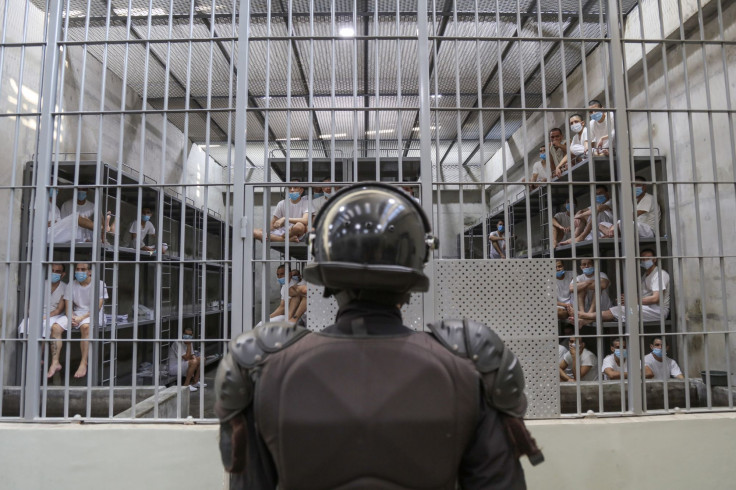
Rights groups are increasingly worried that El Salvador's notorious CECOT prison is becoming a "black hole" for the United States to rid itself of expelled migrants or other unwanted people with no legal consequences.
A US senator who traveled to the Central American country Wednesday to try and retrieve a man wrongly deported and locked up there was sent away without even being able to speak to him.
The man, Salvadoran Kilmar Abrego Garcia, is one of nearly 300 migrants -- mostly Venezuelans -- the Donald Trump administration has sent to El Salvador since January without any kind of court hearing.
Once there, they were locked up in the infamously harsh Terrorism Confinement Center built to house gangsters rounded up in President Nayib Bukele's iron-fisted anti-crime drive.
Observers say most of the migrants had committed no crime, and many had enjoyed asylum status in the United States.
None have been heard from since they were sent to El Salvador, where they are now in legal limbo.
Human Rights Watch, in a report last week, said El Salvador and the United States have subjected dozens of people to "enforced disappearances and arbitrary detention."
At the CECOT, they are held incommunicado, not allowed even contact with lawyers.
"What they are trying to create here is a Guantanamo on steroids... a black hole where there is no legal protection for the people there," Juan Pappier, HRW's America's deputy director, told AFP, referring to the US prison for terror suspects at a military base in Cuba. It is synonymous with torture and other abuses.
The deportation of Abrego Garcia in particular has sparked an outcry and set off a legal crisis.
Trump officials have claimed he is an illegal migrant, a gang member and involved in human trafficking. He has never been convicted of any crime and had been granted a protected status that should have barred his deportation to El Salvador.
A federal judge, backed by the Supreme Court, has ordered Abrego Garcia's return, but the Trump administration contends he is now solely in Salvadoran custody.
Bukele, who has proudly adopted the moniker of "world's coolest dictator," has said he does not have the power to send the man back.
Hoping to heap political pressure on the Trump administration, Maryland Senator Chris Van Hollen visited El Salvador on Wednesday to plead the case of Abrego Garcia, who he said was illegally abducted from the United States.
Van Hollen met Vice President Felix Ulloa, who denied him all access to the man.
"His answer was that the Trump administration is paying El Salvador, the government of El Salvador, to keep him at CECOT," the senator said of the response he got from Ulloa.
Washington and San Salvador have shrugged off criticism of their collaboration, and Trump on Monday warmly thanked Bukele for "helping us out" with his administration's mass deportation drive.
El Salvador is receiving $6 million to house the migrants, and Bukele left Monday's meeting with an agreement for his country to join the US Global Entry program, which allows expedited visa entry.
"Bukele's cooperation with President Trump's agenda, including disappearing people overseas... and into prisons notorious for abuse, is unprecedented, rights-violating and extreme," Noah Bullock of Central American rights group Cristosal said on X.
AFP interviewed several relatives of Venezuelans detained in El Salvador, all of whom insisted their loved ones were not criminals.
Alexis de Hernandez, mother of 31-year-old Andry Hernandez Romero, said her son was rounded up "just for having tattoos" -- a common complaint in this drama.
US officials have claimed the markings indicate loyalty to Venezuela's Tren de Aragua gang, but experts note that the group -- unlike Salvadoran gangs -- does not use tattoos for clan identification.
According to Cristosal, nearly half of the CECOT detainees it has been able to trace had asylum status in the United States or were applying for asylum, "which should protect them from deportation."
Trump has encouraged Bukele to build more jails and said Tuesday he would "love" to start also sending American citizens who commit violent crimes to the CECOT.
The Washington-based WOLA advocacy group warned in a commentary published Monday "that thousands of citizens are languishing in Et Salvador's abusive prison system" and "at least 350 people have died in custody as a result of these conditions."
"Corruption and lack of transparency (in El Salvador) should be of bipartisan concern" for the United States, it argued.
"The US must not only monitor how its financial assistance is being used, but also examine whether it is inadvertently supporting a government that systematically withholds information and evades accountability."




